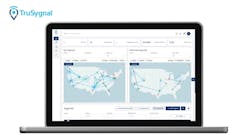Laura Temple joined Champion Tire & Wheel in 2014. The move solidified her family as a NASCAR family. Her husband, Doug Temple, has been serving the NASCAR industry since 2005, currently working as an electrical engineer for the Joe Gibbs Racing team.
Champion Tire & Wheel provides support hauling extra materials and equipment for NASCAR teams during race season. While NASCAR teams often have one truck that transports two race cars and toolboxes to each track, there is a wide range of other equipment necessary for each race. That’s where Champion comes in.
“The crew chiefs are all standing on these massive pit boxes … with their branding on them. They weighed between 4,000 and 6000 pounds. They're huge and they cannot fit those on their haulers,” explained Temple. In addition to transporting pit boxes, Champion will haul tire carts, crash carts, generators, grills and cooking equipment.
Champion owns its entire fleet of approximately 40 Peterbilt Model 379s and 389s. Additionally, the fleet owns several custom trailers equipped with liftgates capable of lifting up to 6,000 lb.
Temple, the human resources director and general counsel for Champion, is very familiar with the operational aspects behind running this equipment and managing employee needs throughout the season.
She wears many hats, as Temple puts it. She handles all human resources matters for the approximately 60 employees – 40 of which are Class A commercial driver license truck drivers – along with various operational responsibilities. Her day-to-day can mean anything from booking travel for drivers on the road during racing season, to researching insurance costs requirements or the latest Federal Motor Carrier Safety Administration hours of service and other compliance rules.
In her role, Temple has recognized the challenges of employee management and worked to avoid a “one-size-fits-all” approach.
This means addressing specific needs for different employee groups, particularly drivers. “It's difficult because [the drivers] are gone for so much at the time, but you still need to build a rapport with them,” Temple said.
Her aim has been to provide “parity and fairness” among the staff. This means introducing rules and guidelines like an employee handbook, and also evaluating certain processes to ensure they are meeting the needs of all staff.
For instance, Temple recognized paid time off was renewed at the hiring anniversary for drivers. A driver hired early in the calendar year might then be less inclined to take time off around holidays, explained Temple. She updated the PTO policy to renew for all during the beginning of the calendar year for all employees.
Safety and technology focus
Even with Champion’s specialized focus, working in the trucking industry for several years now has highlighted to Temple just how essential trucks are to various aspects of everyday life.
“We walk into a grocery store and pick stuff off the shelves and do not think about what went into getting that product to people, and even with our very narrow, specialized focus on trucking, I can't imagine the logistics that goes into a lot of products that we use,” she said.
With Temple’s background, she does recognize the importance of legislation to provide higher safety standards for the industry. She appreciates that focus on safety and embracing of new technology, even while it can sometimes take time for broad acceptance. She cited electronic logging devices (ELDs) as one example.
“Nobody wanted electronic logs,” Temple said. “But as an administrator, being able to see what somebody is doing and where they're doing it and being able to keep an eye on the trucks that much more is invaluable.”
Temple views embracing new safety technologies as opportunities to make vehicles on the road safer, but also to help mitigate the rising insurance costs fleets have dealt with over the last several years, and help to exonerate drivers who may be accused but ultimately not responsible for an accident.
As it relates to technology, three years ago Champion introduced a custom-built smartphone app to help drivers track their schedules, location, and fuel stops while on the road. As with any new technology, Temple confirmed drivers were reluctant to use the app, until they realized the value.
“Now they all love it. They can see their schedule, and they can see what races they're going to. If they put in for PTO, they can see it on their calendar,” she said. “Everyone kicks and screams about technology until they find a use for it for themselves, and it becomes essential.”
Family and flexibility
Before joining the commercial vehicle industry, Temple worked as a real estate attorney.
When she worked as an attorney, she billed hourly, and having two young children at home proved challenging for the varied hours she was required to put in for real estate closings and other job responsibilities. With her move to Champion, she appreciated the family atmosphere and added support.
Temple shared the example of having to care for a sick child when her twin daughters were about four years old. She acknowledged the added challenge of billing by the hour and requiring extremely flexible hours to set up real estate closing appointments as a real estate attorney.
“It's appointment-based and you can't tell somebody they can't buy their new their first house because the attorney’s daughter has a tummy ache,” said Temple. “It was a good shift for us to come to a workplace, an environment where it wasn't so stressful. … A lot of what I do, I can handle remotely or from home, or I can come back in and make it up. And it's not by the hour billing.”
While Temple has really enjoyed her transition to Champion, it was not without learning more about the new industry she would be serving.
“I came in not knowing a lot about trucking,” said Temple. “I've had wonderful support from people because walking in and realizing how many layers of complexity there are to keep the trucks on the road, valid, safe is far more than I realized.”
For those starting out in the industry, Temple suggested “taking the time to ask questions and using as many resources as possible.”
“I'm amazed by this industry—especially coming from law where it’s a lot of people holding on tight to their work—how open the industry is, and how many great resources there are.”




